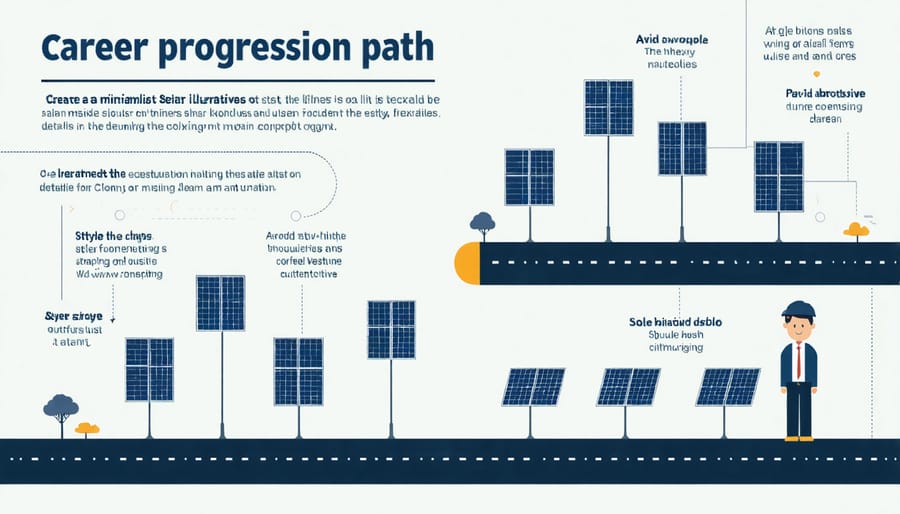The solar industry stands at the forefront of America’s energy revolution, offering unprecedented career opportunities across a diverse spectrum of roles. From solar installers earning $45,000-$70,000 annually to engineering positions commanding six-figure salaries, the sector’s job market is expanding at triple the rate of traditional energy industries. With over 250,000 solar workers nationwide and projections showing 50% growth by 2030, this field represents one of the most promising career paths in the sustainable energy sector.
Solar careers span multiple disciplines, requiring varying levels of education and expertise. Entry-level positions like installation technicians often need only technical certification, while project managers and solar engineers typically require bachelor’s degrees. The industry particularly values skilled trades professionals, offering accelerated career advancement for electricians, construction workers, and HVAC specialists transitioning into solar roles.
Whether you’re a recent graduate, skilled tradesperson, or experienced professional seeking a career change, the solar industry offers stable, well-paying positions with strong growth potential. The sector’s rapid expansion, coupled with increasing demand for clean energy solutions, creates an ideal environment for long-term career development and professional advancement in a field that directly impacts global sustainability.
High-Demand Solar Industry Careers
Installation and Technical Roles
Installation and technical roles form the backbone of the solar industry, offering diverse career opportunities for hands-on professionals. Solar installers are crucial team members who execute the solar panel installation process, requiring physical capability and attention to detail. These professionals work on residential and commercial rooftops, ensuring proper mounting, wiring, and system functionality.
Solar technicians focus on maintenance, troubleshooting, and repair of existing systems. They combine electrical knowledge with problem-solving skills to keep solar installations operating at peak efficiency. This role often involves using diagnostic tools and staying updated with the latest solar technologies.
Engineering positions in solar energy span various specializations, including electrical, mechanical, and structural engineering. These professionals design solar systems, optimize energy production, and develop innovative solutions for challenging installations. They also play vital roles in product development and quality control.
These positions typically require specific certifications, such as NABCEP certification for installers, or relevant engineering degrees. The field offers excellent growth potential, competitive salaries, and the satisfaction of contributing to a sustainable future.

Sales and Customer Service Positions
Sales and customer service positions play a vital role in the solar industry’s growth, offering exciting opportunities for those with strong interpersonal skills. Solar sales representatives help homeowners and businesses understand the benefits of solar energy, customize solutions, and guide them through the installation process. These roles typically offer competitive base salaries plus commission structures, making them attractive for career-minded individuals.
Customer service specialists handle inquiries, manage relationships, and ensure smooth communication between clients and installation teams. They often work with scheduling, maintenance requests, and warranty claims. Many companies prefer candidates with experience in renewable energy, but strong communication skills and a passion for sustainability can open doors for newcomers.
Both positions typically require excellent communication abilities, basic technical understanding, and problem-solving skills. Companies often provide comprehensive training programs to help new hires understand solar technology and industry regulations, making these roles accessible to those transitioning from other industries.
Project Management and Operations
Project managers and operations professionals play crucial roles in the solar industry, overseeing everything from initial site assessments to final system installations. These positions typically require a blend of technical knowledge and strong leadership skills. Project managers coordinate with clients, contractors, and installation teams while ensuring projects stay on schedule and within budget.
Operations managers focus on maintaining smooth day-to-day activities, managing inventory, coordinating maintenance schedules, and optimizing workforce efficiency. Many professionals in these roles start as installers or technicians before advancing to management positions, though some enter directly with relevant business or engineering degrees.
Key responsibilities include resource allocation, quality control, safety compliance, and team supervision. These roles often offer competitive salaries and growth opportunities, especially as solar companies expand their operations. Strong communication skills, problem-solving abilities, and experience with project management software are valuable assets for these positions.
Training and Certification Requirements
Technical Certifications
Obtaining solar industry certifications is crucial for advancing your career in solar installation and technical roles. The North American Board of Certified Energy Practitioners (NABCEP) certification is widely recognized as the gold standard, particularly the PV Installation Professional Certification. This credential demonstrates expertise in designing and installing solar systems safely and effectively.
Entry-level professionals often start with the NABCEP PV Associate Program, which provides foundational knowledge. For those focused on solar system maintenance, the NABCEP PV System Inspector certification is valuable. The Electronics Technicians Association (ETA) offers the Photovoltaic Installer certification as another respected option.
Safety certifications like OSHA-10 or OSHA-30 are essential for installation work. Additional valuable certifications include the Solar Energy International’s (SEI) Solar Professional Certificate Program and UL’s PV System Installation Certification.
Most certifications require a combination of classroom training, hands-on experience, and passing an exam. Many employers offer training programs to help employees earn these credentials, making it easier to advance in the field while working. Regular renewal and continuing education are typically required to maintain certification status.
Education and Training Programs
The solar industry offers numerous educational pathways to help you start or advance your career. Community colleges across the country provide specialized solar installation and technology programs, many of which can be completed in 6-12 months. These programs typically combine classroom learning with hands-on training, ensuring you’re job-ready upon completion.
For those seeking higher education, many universities now offer bachelor’s degrees in renewable energy systems or sustainable engineering, with specific focuses on solar technology. Online certification programs are also available through organizations like the North American Board of Certified Energy Practitioners (NABCEP), which is highly respected in the industry.
Trade schools and vocational training centers frequently partner with solar companies to offer apprenticeships, providing valuable real-world experience while you learn. Many of these programs include safety training, system design basics, and electrical fundamentals.
Professional development opportunities don’t stop at entry-level. Advanced certifications and specialized training programs are available for experienced professionals looking to move into system design, sales, or project management roles. Some employers even offer tuition reimbursement or sponsored training programs, making it easier to advance your solar career while working.
Remember to research local training programs, as requirements and certifications can vary by state and region.

Career Growth and Salary Potential
Entry-Level to Expert: Career Progression
The solar industry offers numerous paths for career advancement, making it an attractive field for long-term professional growth. Many professionals start as solar installers or sales representatives, gaining hands-on experience with solar technology and customer relations. With experience and additional certifications, installers can progress to team leaders or project managers, overseeing large-scale installations and managing crews.
Those starting in sales often advance to regional sales managers or business development directors. Technical roles like solar technicians can evolve into system designers or engineering positions with the right education and experience. Quality assurance specialists frequently move into operations management roles, while those with business acumen might progress to executive positions overseeing entire divisions.
Many companies offer training programs and support for continuing education, making it easier to climb the career ladder. Some professionals even branch out to start their own solar installation companies or consulting firms after gaining comprehensive industry experience. The key to advancement often lies in pursuing relevant certifications, staying updated with evolving technology, and developing leadership skills alongside technical expertise.

Compensation and Benefits
The solar industry offers competitive compensation packages, with salaries varying significantly based on role, experience, and location. According to recent solar industry salary trends, entry-level installers typically earn between $35,000 and $45,000 annually, while experienced solar project managers can command salaries ranging from $75,000 to $120,000. Solar sales representatives often earn substantial commissions on top of their base salaries, potentially reaching total earnings of $100,000 or more annually.
Benefits packages in the solar sector are generally comprehensive, including health insurance, retirement plans, and paid time off. Many companies offer additional perks such as ongoing training, certification reimbursement, and performance bonuses. Some employers provide company vehicles for field positions and flexible work arrangements for office-based roles.
Remote work opportunities are increasingly common, particularly for design, sales, and project management positions. Career advancement potential is strong, with many companies promoting from within and supporting professional development through mentorship programs and specialized training opportunities.
Getting Started in Solar
Building Your Solar Career Path
Building a career in the solar industry starts with identifying your interests and strengths. Whether you’re technically inclined, sales-oriented, or passionate about project management, there’s a path for you. Begin by researching certification programs and vocational training specific to your chosen role. Many community colleges offer solar installation courses, while professional organizations provide specialized certifications.
Entry-level positions, such as solar installer or sales representative, often require minimal experience but provide excellent foundations for growth. Consider apprenticeships or internships to gain hands-on experience while learning from industry veterans. Network through professional associations and attend solar energy conferences to build connections and stay informed about industry developments.
As you progress, pursue additional certifications and continuing education to advance your career. Many professionals start as installers and move into system design, project management, or technical sales roles. Some even launch their own solar businesses after gaining experience.
Remember that the solar industry values both technical expertise and soft skills. Develop your communication abilities, problem-solving skills, and customer service mindset alongside technical knowledge. Stay current with industry trends and emerging technologies to position yourself for long-term success in this rapidly growing field.
Networking and Resources
Building a strong professional network is crucial for success in the solar industry. Start by exploring industry associations like the Solar Energy Industries Association (SEIA) and the American Solar Energy Society (ASES), which offer valuable membership benefits and solar industry networking tips. These organizations frequently host conferences, webinars, and local meetups where you can connect with industry professionals and potential employers.
LinkedIn groups dedicated to solar energy and renewable technologies provide excellent platforms for staying updated on industry trends and job openings. Join groups like “Solar Professional Network” and “Renewable Energy Professionals” to engage with industry leaders and peers.
Consider attending solar trade shows and career fairs, such as RE+, North America’s largest renewable energy event. These gatherings offer unprecedented networking opportunities and direct access to hiring managers from leading solar companies.
Online resources like Solar Energy International (SEI) and the Interstate Renewable Energy Council (IREC) offer training programs and certification courses that can enhance your credentials while connecting you with other professionals in the field. Many of these organizations also maintain job boards specifically focused on solar industry positions.
Keep an active online presence by sharing industry insights and participating in renewable energy discussions on professional platforms.
The solar industry stands as one of the most promising career paths in today’s rapidly evolving job market. With continued technological advancements, growing environmental awareness, and increasing demand for sustainable energy solutions, the future of solar careers has never looked brighter. Industry projections suggest that solar jobs will continue to multiply over the next decade, offering stable, well-paying opportunities across various skill levels and interests.
Whether you’re interested in hands-on installation work, engineering, sales, or project management, the solar industry provides multiple entry points for career seekers. The key to success lies in taking proactive steps toward your solar career goals. Start by researching certification programs in your area, networking with industry professionals, and gaining relevant experience through internships or entry-level positions.
Consider joining professional organizations, attending solar industry conferences, and following leading companies in the sector to stay informed about the latest developments and job opportunities. Many successful solar professionals began their journeys with simple curiosity and determination, eventually building rewarding careers that contribute to a more sustainable future.
Remember that the solar industry values both technical expertise and soft skills. Focus on developing a well-rounded skill set that combines technical knowledge with communication, problem-solving, and customer service abilities. With the right preparation and dedication, you can build a fulfilling career in this dynamic and growing field while making a positive impact on the environment.









